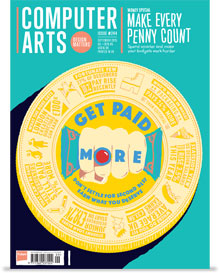How to set every design project budget in 4 steps
Moving Brands' Paul Martin reveals how budgets work in one of the world's most celebrated agencies.
Daily design news, reviews, how-tos and more, as picked by the editors.
You are now subscribed
Your newsletter sign-up was successful
Want to add more newsletters?

Five times a week
CreativeBloq
Your daily dose of creative inspiration: unmissable art, design and tech news, reviews, expert commentary and buying advice.

Once a week
By Design
The design newsletter from Creative Bloq, bringing you the latest news and inspiration from the worlds of graphic design, branding, typography and more.

Once a week
State of the Art
Our digital art newsletter is your go-to source for the latest news, trends, and inspiration from the worlds of art, illustration, 3D modelling, game design, animation, and beyond.

Seasonal (around events)
Brand Impact Awards
Make an impression. Sign up to learn more about this prestigious award scheme, which celebrates the best of branding.
On a very basic level, a budget dictates how much you have to invest in a project. The quality of the creative vision should always dictate the numbers – that's what you've sold the client after all.
However, a solid budget ensures you don't overreach, overspend and end up running out of money. For that reason, the very best budgeting gets the greatest value at a creative level, while maximising profit margins at a business level.
We talk to Paul Martin, global operations director of Moving Brands, and find out how budgets work in one of the world's most celebrated agencies...

At Moving Brands, is it common to set a budget before or after the pitch stage?
Our first step, whether it's a pitch response or a request for proposal from an existing or new client, is to qualify the project: whether the client's needs match our expertise; whether their timing and budget parameters align to how we would best deliver on their objectives.
In regards to budget, we give an indicative scope and budget parameters early on to help the client understand how we would approach the work and the related cost. The reality is it will take numerous conversations to properly scope the needs, shape the team, plan the timings and project milestones.
How do you typically arrive at a final figure for a creative budget?

We build a project plan from scratch for every project, to ensure it's fit for purpose. This process involves the programme lead, the creative lead and consultant.
- Discuss and clarify the client needs
- Build the right shape team of experts to deliver on the needs
- Build a project plan which includes scope, timings and of course budget
- Share and discuss the plan with the client, until a mutual agreement is met on all aspects
Do creatives need financial knowledge, or should P&L lines be left to Accounts?
We're a creatively led business – our CEO joined the business as a design intern, our founders are film-makers and designers. We've never believed in silos and don't think that P&L lines should be left solely to the accountants.
Daily design news, reviews, how-tos and more, as picked by the editors.
At a project level, our creative directors are involved in scoping every project they lead, and alongside the programme directors are jointly responsible for both financial performance and creative excellence.
So yes, a good proportion of our creative team need an understanding of the financial aspects, because it's part of being able to effectively scope and deliver on all briefs, and to run a successful global business.
Words: Tom Dennis
Illustration: Jo Gulliver

The full version of this article first appeared inside Computer Arts issue 244: Earn More as a Designer – packed full of financial tips for creatives – on sale now.
Liked this? Try these...
- The designer's guide to making budgets work
- The 20 best watches for designers
- Download the best free fonts

The Creative Bloq team is made up of a group of art and design enthusiasts, and has changed and evolved since Creative Bloq began back in 2012. The current website team consists of eight full-time members of staff: Editor Georgia Coggan, Deputy Editor Rosie Hilder, Ecommerce Editor Beren Neale, Senior News Editor Daniel Piper, Editor, Digital Art and 3D Ian Dean, Tech Reviews Editor Erlingur Einarsson, Ecommerce Writer Beth Nicholls and Staff Writer Natalie Fear, as well as a roster of freelancers from around the world. The ImagineFX magazine team also pitch in, ensuring that content from leading digital art publication ImagineFX is represented on Creative Bloq.
